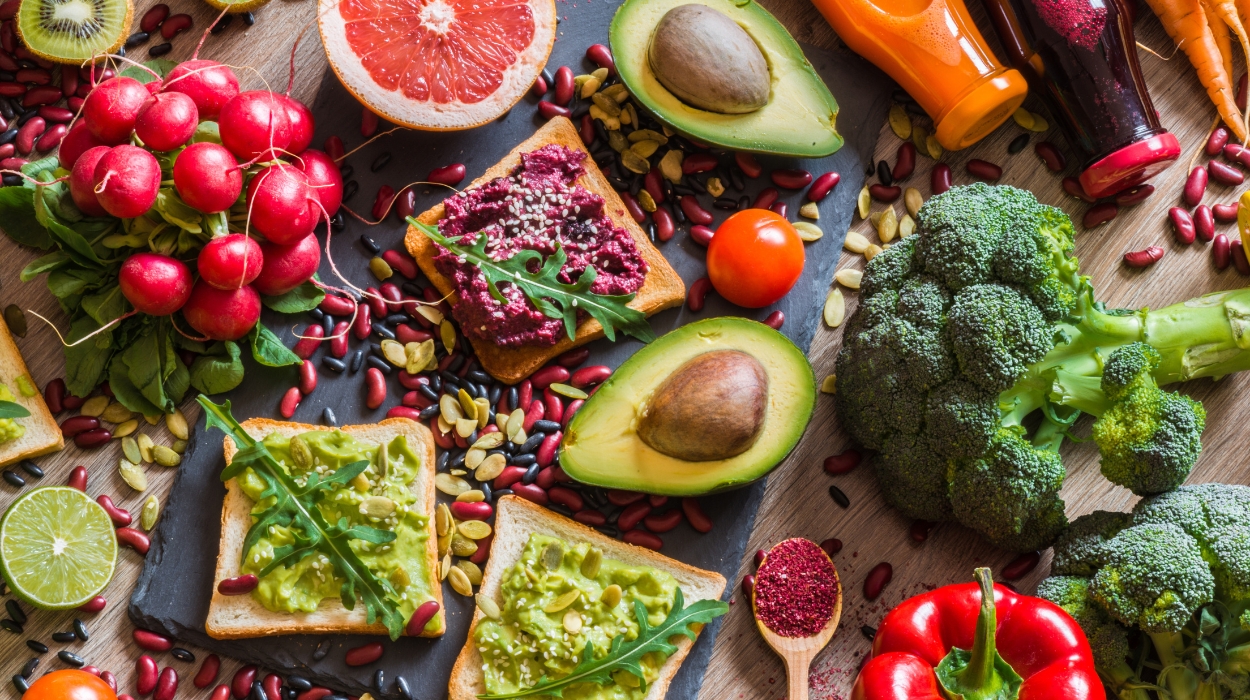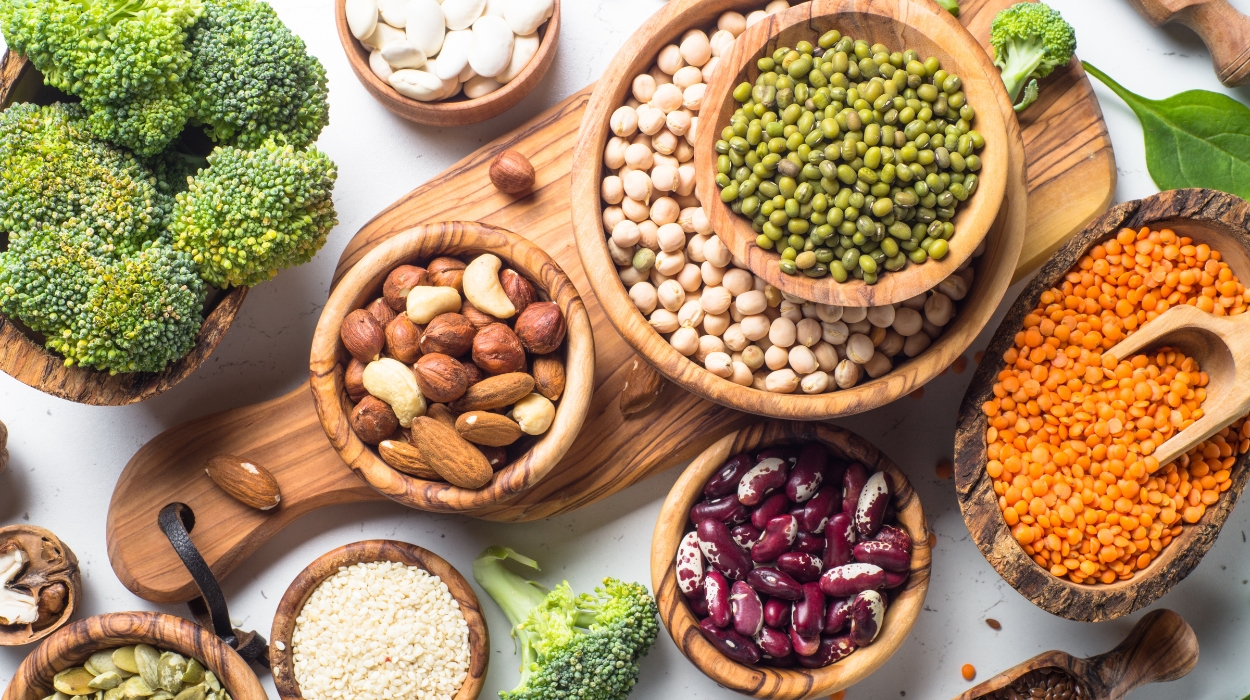 Expert's opinion
Expert's opinion
Expert's opinion
The article is a subjective view on this topic written by writers specializing in medical writing.
It may reflect on a personal journey surrounding struggles with an illness or medical condition, involve product comparisons, diet considerations, or other health-related opinions.
Although the view is entirely that of the writer, it is based on academic experiences and scientific research they have conducted; it is fact-checked by a team of degreed medical experts, and validated by sources attached to the article.
The numbers in parenthesis (1,2,3) will take you to clickable links to related scientific papers.
Vegan Diet For Weight Loss: Your 2024 Weight Loss Guide

Are you considering weight loss as a personal goal? If that’s the case, exploring the potential health benefits of adopting a vegan diet might be a worthwhile solution to explore. Focusing on more plant-based foods and making mindful diet choices can help you lose weight while nourishing your body.
This article will provide simple instructions to get started on a vegan diet to lose weight. From emphasizing whole foods to controlling portion sizes and incorporating plant-based proteins, we’ll guide you toward a healthier weight. Let’s examine the effectiveness of vegan diets in helping you achieve your desired weight loss objectives.
Vegan Diet To Lose Weight: Does It Work?
A plant-based diet does potentially aid in weight loss. Vegan foods are lower in calorie density than animal-based foods, thus helping to create a calorie deficit for weight loss. Also, plant-based foods are typically high in fiber, which promotes feelings of fullness and reduces overeating.
Vegan Diet For Weight Loss: Does It Help?
Is a vegan diet good for weight loss? Yes, vegan foods can potentially aid in healthy weight loss. They are lower in calorie density than animal-based foods, which can help create a calorie deficit for weight loss.
Additionally, plant-based foods are typically high-fiber foods, promoting feelings of fullness and reducing overeating.
A vegan diet for weight loss also limits the intake of unhealthy fats found in animal products. It favors healthy fat sources like nuts, seeds, and avocados. The nutrient-dense nature of many vegan foods supports overall health during weight loss.
What Is A Vegan Diet For Weight Loss?

A vegan diet is a dietary approach that excludes all animal products and by-products. It primarily focuses on plant-based foods such as fruits, vegetables, whole grains, legumes, nuts, and seeds.
Vegans avoid consuming meat, poultry, fish, dairy products, eggs, and honey. The diet is based on ethical, environmental, and health considerations.
Following a vegan diet will help individuals promote animal welfare, reduce their environmental impact, and improve their health by consuming a variety of nutrient-rich plant foods.
How To Lose Weight On A Vegan Diet
When it comes to losing weight on a vegan diet, the same principles apply to any weight loss plan. It involves creating a calorie deficit and making healthy diet choices. Here are some tips to help you maximize your vegan weight-loss diet:
Prioritize Whole, Plant-Based Foods
Center your plant-based meals around nutrient-rich options like fruits, vegetables, whole grains, legumes, green powder supplements, nuts, and seeds. These foods tend to be lower in calories and higher in fiber, helping you feel satisfied and full. A plant-based diet is an excellent choice for weight loss.
Keep Track Of Your Calorie Intake
To promote weight loss, it’s important to consume fewer calories[1] than your body burns. Consider using a food diary to monitor your daily calorie intake and ensure that you are in a calorie deficit. Monitoring your body weight is crucial to keep track of your progress and adjust your diet accordingly.
Also, be aware of your portion sizes, and be mindful of high-calorie foods such as nuts, seeds, avocados, and oils.
Incorporate An Ample Amount Of Fiber
Including fiber-rich foods can not only help you feel full for longer periods but also support weight loss efforts. You should include whole grains like quinoa and oats, as well as legumes, chia seeds, and fruits and veggies in your healthy diet.
Restrict Processed Foods
Some vegan meal delivery outlets offer convenient processed vegan foods. These often contain high levels of calories, along with unhealthy fats and added sugars. Limiting the consumption of vegan junk food such as ice cream substitutes, cookies, or processed meat substitutes is recommended.
Choose Healthier Cooking Methods
Selecting cooking techniques such as baking and grilling instead of frying can help reduce the overall calorie count of your meals.
Practice Mindful Eating
Overeating healthy vegan foods may result in unwanted weight gain. Paying attention to portion sizes and listening to your body’s hunger and fullness signals are key to achieving weight loss with plant-based diets.
Stay Hydrated
Drinking enough water[2] can help curb hunger and prevent overeating. Aim to drink water throughout the day and consider having a glass before meals to help control your appetite.
Engage In Regular Physical Activity
Combine your healthy vegan diet with regular exercise to enhance weight loss. Engaging in activities[3] like walking, jogging, cycling, or strength training can help burn calories and increase your metabolism.
Get Enough Protein

Ensure you are consuming enough protein from plant-based sources[4] like legumes, tofu, tempeh, seitan, lentils, quinoa, and edamame. Plant-based protein can help keep you satiated and preserve muscle mass during weight loss.
Seek Support And Guidance
Consider working with a registered dietitian nutritionist specializing in vegan diets. They can help you create a personalized meal plan, offer guidance, and address specific nutritional concerns.
Delicious Vegan Dishes To Help Lose Weight
Here is a list of delicious vegan dishes to help with weight loss:
- Quinoa Salad.
- Roasted Vegetable Medley.
- Chickpea and Vegetable Stir-Fry.
- Zucchini Noodles with Marinara.
- Lentil and Vegetable Soup.
- Grilled Portobello Mushroom Burger.
- Spinach and Berry Salad.
Possible Risks If You Lose Weight Rapidly
Rapid weight loss can present specific health risks that need to be considered. Here are some potential risks associated with rapid weight loss:
Muscle Loss
When you lose weight quickly, a significant portion may come from muscle tissue. This can lead to muscle weakness,[5] decreased metabolism, and difficulty in maintaining weight loss in the long term.
Nutritional Deficiencies
Rapid weight loss often involves severe calorie restriction, making it challenging to meet your nutritional needs. Insufficient intake of essential nutrients like protein vitamins, and minerals can result in deficiencies and negatively impact your overall health.
Gallstones
Rapid weight loss increases the risk of developing gallstones,[6] which are hard deposits that form in the gallbladder. Gallstones can cause severe pain and may require medical intervention.
Electrolyte Imbalances
Rapid weight loss can disrupt the balance of electrolytes in your body, such as sodium, potassium, and magnesium. Electrolytes play a crucial role in maintaining proper nerve and muscle function. Level imbalances can lead to weakness, fatigue, and irregular heart rhythms.
Decreased Immune Function
A significantly reduced calorie intake can weaken your immune system, making you more susceptible to infections and illnesses.
Loss Of Menstrual Cycle
Rapid weight loss can disrupt hormonal balance and lead to the cessation of menstruation, known as amenorrhea.[7] This can have long-term implications for reproductive health and bone density.
Emotional And Psychological Effects
Rapid weight loss can strain your mental well-being.[8] It may lead to feelings of deprivation, obsession with food and weight, body dissatisfaction, and an increased risk of developing eating disorders.
It’s important to prioritize slow and sustainable weight loss through a balanced diet and regular physical activity. If you have concerns about your weight or want to lose weight, consult a healthcare professional.
The Takeaway
A vegan diet can be an effective approach to weight loss and weight maintenance while promoting overall health and well-being.
Focusing on a nutrient-dense, whole-food, plant-based diet and incorporating regular physical activity can help you enhance your fiber intake and minimize the consumption of unhealthy fats. It is essential to prioritize gradual, sustainable weight loss and consult with a healthcare professional or registered dietitian for personalized guidance.
Adopting a vegan lifestyle is not a guarantee for weight loss. And whether you’re eating vegan food to lose weight or support your overall health, balance is key. The combination of mindful food choices, portion control, and a balanced approach leads to successful and lasting weight management.
Frequently Asked Questions
While rapid weight loss is not recommended for long-term success, a vegan can accelerate weight loss by focusing on whole, plant-based foods with low-calorie density, increasing physical activity, and being mindful of portion sizes.
When you adopt a well-planned vegan eating pattern that includes nutrient-dense foods, portion control, and a calorie deficit, you can achieve weight loss.
Losing weight as a vegan can present its challenges, but it is not inherently harder. Like any weight loss journey, success depends on factors such as calorie intake, food choices, physical activity levels, and overall lifestyle habits.
Weight loss on a 30-day vegan diet varies based on factors like starting weight and calorie intake. Sustainable weight loss typically aims for 1-2 pounds per week so a realistic expectation would be losing 4-8 pounds in 30 days.
While some vegan processed foods can be part of a balanced diet, they tend to be higher in calories and may contain unhealthy additives.
A well-planned vegan diet can provide sufficient protein for weight loss.
Tracking calories can be helpful for weight loss, as it allows you to monitor your intake and create a calorie deficit.
Yes, there are many delicious vegan desserts that can be enjoyed as part of a weight loss plan. Look for recipes using whole food ingredients, natural sweeteners like dates or maple syrup, and healthier alternatives like fruit-based desserts.
+ 8 sources
Health Canal avoids using tertiary references. We have strict sourcing guidelines and rely on peer-reviewed studies, academic researches from medical associations and institutions. To ensure the accuracy of articles in Health Canal, you can read more about the editorial process here
- Kim, J.-Y. (2021). Optimal Diet Strategies for Weight Loss and Weight Loss Maintenance. [online] 30(1), pp.20–31. doi:https://doi.org/10.7570/jomes20065.
- Burls, A., Price, A., Cabello, J. and Roberts, N. (2019). Drinking extra water or other non-caloric beverages for promoting weight loss or preventing weight gain. [online] doi:https://doi.org/10.1002/14651858.cd012211.pub2.
- Willis, E.A., Creasy, S.A., Honas, J.J., Melanson, E.L. and Donnelly, J.E. (2019). The effects of exercise session timing on weight loss and components of energy balance: midwest exercise trial 2. [online] 44(1), pp.114–124. doi:https://doi.org/10.1038/s41366-019-0409-x.
- Sapna Langyan, Pranjal Yadava, Khan, F., Zahoor Ahmad Dar, Singh, R. and Kumar, A. (2022). Sustaining Protein Nutrition Through Plant-Based Foods. [online] 8. doi:https://doi.org/10.3389/fnut.2021.772573.
- Weiss, E.P., Jordan, R.F., Frese, E., Albert, S.G. and Villareal, D.T. (2017). Effects of Weight Loss on Lean Mass, Strength, Bone, and Aerobic Capacity. [online] 49(1), pp.206–217. doi:https://doi.org/10.1249/mss.0000000000001074.
- Stokes, C.S. and Lammert, F. (2021). Excess Body Weight and Gallstone Disease. [online] 37(4), pp.254–260. doi:https://doi.org/10.1159/000516418.
- Chen, L., Lu, Y., Zhou, Y., Wang, Y., Zhan, H.-F., Zhao, Y., Wang, Y., Zhang, F.-F., Chen, H. and Li, X. (2023). The effects of weight loss-related amenorrhea on women’s health and the therapeutic approaches: a narrative review. [online] 11(2), pp.132–132. doi:https://doi.org/10.21037/atm-22-6366.
- Pellegrini, C.A., Webster, J., Hahn, K., Leblond, T. and Unick, J.L. (2020). Relationship between stress and weight management behaviors during the COVID‐19 pandemic among those enrolled in an internet program. [online] 7(1), pp.129–134. doi:https://doi.org/10.1002/osp4.465.



